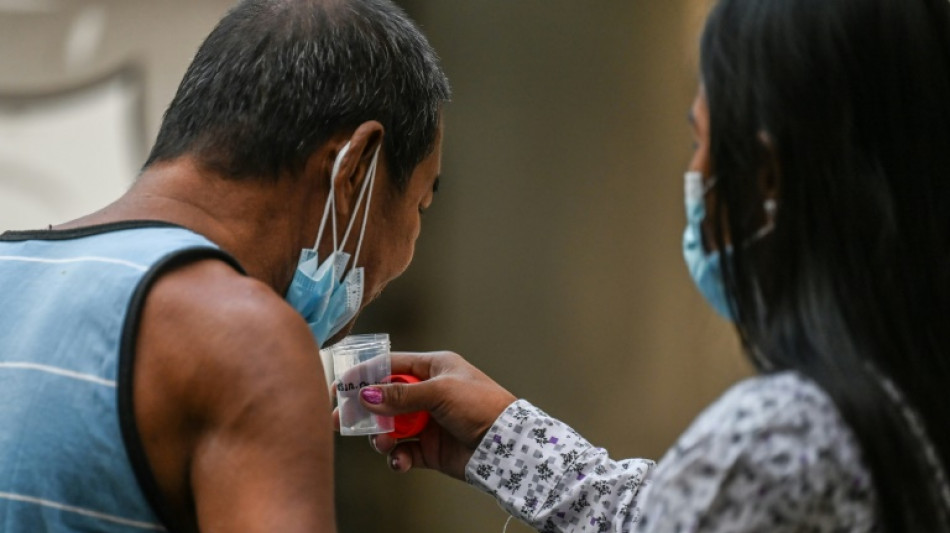
-
 Scotland 'optimistic' Russell will be fit to face Argentina
Scotland 'optimistic' Russell will be fit to face Argentina
-
Big platforms chart gradual path to self-driving at Web Summit
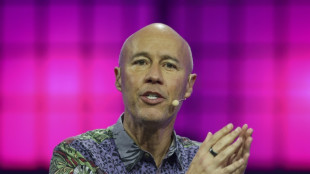
-
 Jane Goodall honored in Washington by conservationists including DiCaprio
Jane Goodall honored in Washington by conservationists including DiCaprio
-
Tuberculosis killed 1.23 million last year: WHO
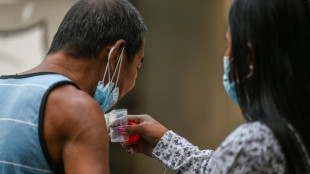
-
 New Zealand coach Robertson says Twickenham visit is 'why I'm doing the job'
New Zealand coach Robertson says Twickenham visit is 'why I'm doing the job'
-
Hopes of US shutdown deal fail to sustain market rally

-
 US military personnel do not risk prosecution for drug strikes: Justice Dept
US military personnel do not risk prosecution for drug strikes: Justice Dept
-
Jailed writer Sansal on way to Germany after Algeria pardon

-
 Ukraine ministers resign over major corruption scandals
Ukraine ministers resign over major corruption scandals
-
Record-breaking US shutdown to end as political fallout begins

-
 Wallets, not warming, make voters care about climate: California governor
Wallets, not warming, make voters care about climate: California governor
-
Astronomers spot storm on another star for first time

-
 G7 foreign ministers seek to boost Ukraine war effort
G7 foreign ministers seek to boost Ukraine war effort
-
Released Epstein emails allege Trump 'knew about the girls'

-
 Rees-Zammit back in Wales 'happy place' after Test return
Rees-Zammit back in Wales 'happy place' after Test return
-
Chelsea winger Sterling's house burgled

-
 Auger-Aliassime beats Shelton to get off mark at ATP Finals
Auger-Aliassime beats Shelton to get off mark at ATP Finals
-
Argentina's Milei to follow Trump in skipping S.Africa G20: spokesperson

-
 Back on track: Belgian-Dutch firm rescues Berlin to Paris sleeper train
Back on track: Belgian-Dutch firm rescues Berlin to Paris sleeper train
-
Los Angeles 2028 Olympic Games schedule revealed

-
 Wolves appoint Edwards as manager in bid to avoid relegation
Wolves appoint Edwards as manager in bid to avoid relegation
-
UK music industry warns growth threatened by AI, Brexit

-
 Epstein alleged Trump 'knew about the girls': Democrats
Epstein alleged Trump 'knew about the girls': Democrats
-
German experts slam spending plans, cut GDP forecast

-
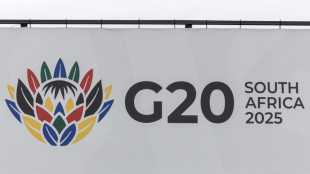 S.Africa's Ramaphosa says US skipping G20 'their loss'
S.Africa's Ramaphosa says US skipping G20 'their loss'
-
Algeria pardons writer Boualem Sansal

-
 Tuchel warns Bellingham must fight for England berth at World Cup
Tuchel warns Bellingham must fight for England berth at World Cup
-
Mbappe says France football team 'to remember' Paris terror victims

-
 Joshua decision on 2025 bout imminent - promoter
Joshua decision on 2025 bout imminent - promoter
-
Cambodia says Thai troops kill one in fresh border clashes
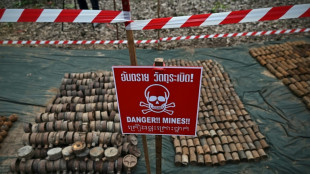
-
 UK holidaymakers told to shout, not get in a flap over seagulls
UK holidaymakers told to shout, not get in a flap over seagulls
-
Pope Leo reels off four favourite films

-
 Lebanese say Israel preventing post-war reconstruction
Lebanese say Israel preventing post-war reconstruction
-
Stocks mostly rise on hopes of US shutdown deal, rate cut

-
 Bayer beats forecasts but weedkiller woes still weigh
Bayer beats forecasts but weedkiller woes still weigh
-
42 feared dead in migrant shipwreck off Libya: UN

-
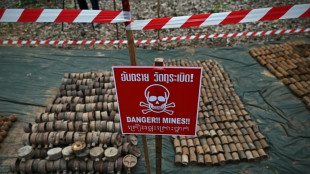 Cambodia, Thailand trade accusations of fresh border clashes
Cambodia, Thailand trade accusations of fresh border clashes
-
Pakistan tightens Islamabad security after suicide blast

-
 Messi return 'unrealistic', says Barca president Laporta
Messi return 'unrealistic', says Barca president Laporta
-
Bayer narrows loss, upbeat on weedkiller legal woes

-
 Corruption scandal, court battles pose test for Zelensky
Corruption scandal, court battles pose test for Zelensky
-
DR Congo ex-rebel leader Lumbala's war crimes trial opens in France
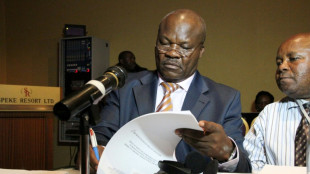
-
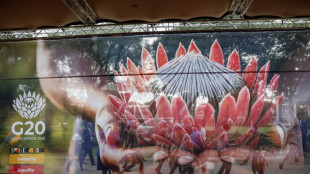 Five things to know about the first G20 held in Africa
Five things to know about the first G20 held in Africa
-
Asian markets rise on hopes over shutdown deal, rate cut

-
 Johannesburg gets rushed makeover for G20 chiefs
Johannesburg gets rushed makeover for G20 chiefs
-
World wine output set for modest 2025 recovery: industry body

-
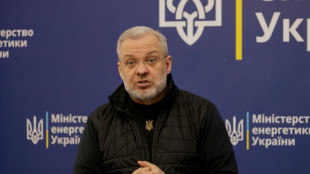 Ukraine justice minister suspended over corruption case: PM
Ukraine justice minister suspended over corruption case: PM
-
Osimhen, Mbeumo potential key figures in African World Cup play-offs

-
 Tanzania politicians in shock as cabal takes over after massacre
Tanzania politicians in shock as cabal takes over after massacre
-
Prague cathedral's long-awaited organ to pipe up in 2026


Tuberculosis killed 1.23 million last year: WHO
Tuberculosis remains the world's leading infectious killer, claiming an estimated 1.23 million lives last year, the UN health organisation said Wednesday as it warned that recent gains made against the disease were fragile.
Deaths from TB were down three percent from 2023, while cases dropped by nearly two percent, the World Health Organization (WHO) said in its annual overview.
An estimated 10.7 million people worldwide fell ill with TB in 2024: 5.8 million men, 3.7 million women and 1.2 million children.
A preventable and curable disease, tuberculosis is caused by bacteria that most often affects the lungs. It spreads through the air when people with TB cough, sneeze or spit.
Now, TB cases and deaths are both declining "for the first time since the Covid-19 pandemic", which disrupted services, said Tereza Kasaeva, head of the WHO department for HIV, TB, hepatitis and sexually transmitted infections.
"Funding cuts and persistent drivers of the epidemic threaten to undo hard-won gains, but with political commitment, sustained investment, and global solidarity, we can turn the tide and end this ancient killer once and for all," she said.
Funding for the fight against TB has stagnated since 2020.
Last year, $5.9 billion was available for prevention, diagnosis and treatment -- way off the target of $22 billion annually by 2027.
-Heaviest burden in India -
Last year, eight countries accounted for two-thirds of global TB cases.
They were India (25 percent), Indonesia (10 percent), the Philippines (6.8 percent), China (6.5 percent), Pakistan (6.3 percent), Nigeria (4.8 percent), the Democratic Republic of Congo (3.9 percent) and Bangladesh (3.6 percent).
The five major risk factors driving the epidemic are undernutrition, HIV infection, diabetes, smoking and alcohol use disorders.
TB is the leading killer of people with HIV, with last year's death toll standing at 150,000.
In 2024, 8.3 million people were newly diagnosed with TB and accessed treatment.
This is a record high, which the WHO attributed to reaching more of the people who fell ill with the disease.
Last year, treatment success rates rose from 68 percent to 71 percent.
The WHO estimates that timely TB treatment has saved 83 million lives since 2000.
- Vaccine research, AI tools -
"Declines in the global burden of TB, and progress in testing, treatment, social protection and research are all welcome news after years of setbacks, but progress is not victory," said WHO chief Tedros Adhanom Ghebreyesus.
"The fact that TB continues to claim over a million lives each year, despite being preventable and curable, is simply unconscionable."
As for the pipeline of TB tests, treatments and vaccines, as of August this year, 63 diagnostic tests were in development and 29 drugs were in clinical trials.
Some 18 candidate vaccines are being tested on humans, including six in Phase III -- the final stage before regulatory approval.
The BCG vaccine has long been part of routine childhood immunisation programmes in many countries.
But despite TB's devastating global impact, no new vaccines have been licensed in over a century, and there are no vaccines for adults.
Peter Sands, head of the Global Fund to Fight AIDS, TB and Malaria, said: "We now have shorter, more effective treatment regimens, improved prevention strategies, and cutting-edge diagnostics, including AI-powered tools that can detect TB faster and more accurately than ever before," he said.
"These innovations are transforming how we fight TB, especially in resource-limited settings."
G.AbuOdeh--SF-PST
